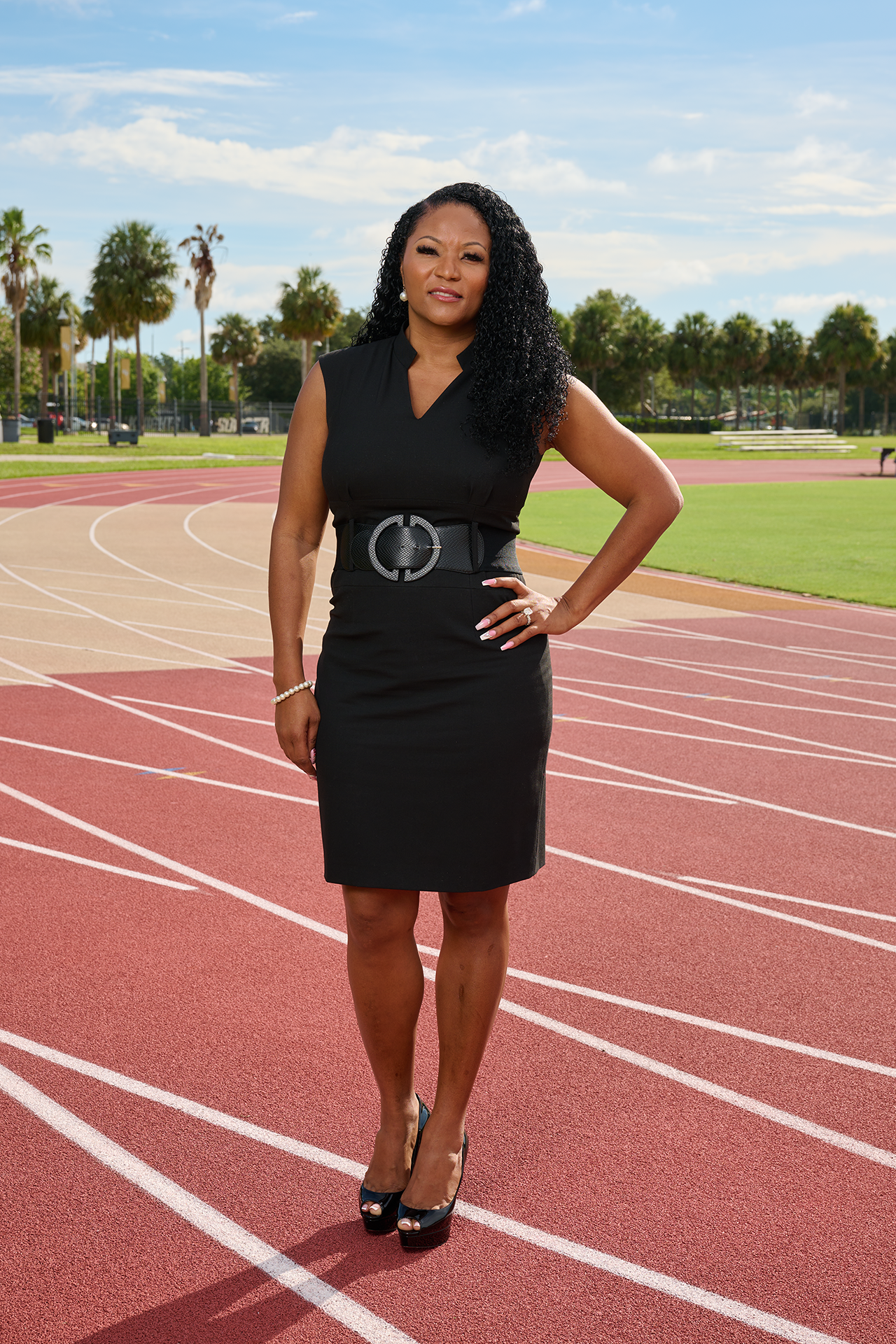
Billion Dollar Bailey
Running gave Trisha Bailey her start in life and continues to be an inspiration. "In running you have to finish the race," she says. And if she gets knocked down, "my greatest revenge is for you to watch me win."
By Kim Krieger
Photos by Peter Morenus
Air you can wear. That's how the meteorologist describes the weather in Orlando this August weekend, and at 10 a.m. the track already shimmers with heat. But when she strides onto the red rubber, she is fresh as a CEO in an air-conditioned boardroom about to announce a better-than-expected earnings report. She's in high heels and it's 96 degrees Fahrenheit with 100% humidity, and she looks like she's a whistle away from taking off, a streak of black on red running an 800 like it's 1999.
"I love the track. Stepping on it gives you a high every time, it's like ahhhh," Trisha Bailey '99 (CLAS) says. But instead of sprinting down the track, she stands patiently as her friend and former teammate Kathy (Holloman) Jackson '99 (BUS), '02 MA fixes a stray lock of hair, and her publicist uses a little saliva and palm grease to rub dust off her blouse. "You're such a mom," Bailey compliments the publicist. Then she shows off her nails, bejeweled to spell "Unbroken." The name of her book being released this weekend is also the perfect word to describe the indefatigable founder of a business empire that stretches from Connecticut to Jamaica. Because broken she could have been.
But in this moment she is the perfect boss lady, the proud Jamaican-born woman who calls all the shots, who runs 16 businesses and a philanthropic organization while raising five children, a mover and a shaker.
Her ability to move — fast — is what first distinguished Bailey. She had early success on the track her sophomore year at Hartford's Weaver High School. And even after her track coach left without a replacement, Bailey continued training, and winning. That track success brought her to UConn, but there was a catch. Her SAT scores were not good enough for her to compete according to NCAA rules at the time. Amazingly, the University took a chance and gave her a scholarship anyway, in expectation that she would get the necessary grades and start winning as soon as she got back on the track.
Freshman year found her at UConn, but still training for the track on her own — and having to succeed at college level work. Gradually Bailey developed a study strategy. Some of the football players had asked to borrow her notes, but she said she would teach them the material instead. When she found she learned better herself that way, she made tutoring the players a regular part of her study schedule, and began getting the grades she needed to compete.
She also became close friends with some of the players, which caused another setback when a misunderstanding led to one of them accusing her of attacking him. Bailey was arrested, and the football player pressed charges. She almost lost her scholarship, and eventually a judge dismissed the case.
Bailey is deeply appreciative of the chances UConn took on her. And she's paying it forward both as a philanthropist who supports students and the University, and as an employer who takes chances on individuals. When budget cuts threatened to cancel UConn's track and field program, Bailey gifted the University $500,000 to save it. Shortly thereafter, she funded the Bailey Student Athlete Success Center, with $15 million, the largest cash donation by an alum and largest gift ever dedicated to UConn Athletics. In doing so, Bailey noted a desire to support less-funded sports programs, and help all student athletes with academics and mental health.
After speaking at Weaver High School's commencement this spring, she surprised a student, an immigrant from Jamaica, with a scholarship to UConn. Bailey earned an MBA and Ph.D. from the University of Phoenix and works with the Jamaican government to help more students earn degrees in science and medicine. Her business ventures stretch across eight states and two countries and include pharmacies, medical supply companies, real estate development, even a 59-horse stable. She was so disciplined about saving and investing her bonuses from her pharmaceutical and brokerage sales jobs after college that she self-financed her business ventures all the way until she began buying commercial real estate. The richest Jamaican-born woman, Bailey is, if not already a billionaire, poised to reach that official status soon.
"... my story, it's not normal. It's deeply disturbing"
But before Trisha Bailey was Dr. Trisha Bailey, a business supernova, or even a track star, she was a young girl growing up dirt poor in Jamaica in the house of her aunt and uncle. She was 13 years old before her mother in the United States sent for her. When her stepfather began sexually abusing her soon after she arrived in Hartford, she felt unable to confide in her mom. Instead, she devised ways to avoid her stepfather. She picked up her little sister at school and began joining sports teams, which is how she found track. Although she was able to escape her stepfather by leaving for college, she was unable to escape the pattern of violent and abusive relationships until much later.
"I've always known my story, it's not normal. It's deeply disturbing — making the decision to write 'Unbroken' and to be so raw and open, it's to help other people," says Bailey. "Young girls, who have not, hopefully, gone through this type of hell — my book can help them see what the predators look like, see what a bad boyfriend looks like."
It's several hours after the photo shoot, and we're at Bailey's lovely downtown Orlando condo. She's radiating kindness and love and happiness as she discusses her book, her business, her family, her terrible track record with men — and her suicide attempt, which ended with her in a coma. She was flown home cross-country while still incapacitated, and the crew of her first flight simply wheeled her into the airport and abandoned her there. Unable to move or speak, she sat crying in the airport for three hours before someone tried to help her. That abandonment fueled her desire to start a business that treats people with genuine care. "I wanted to make sure nobody in the world ever felt that way, the way I did," she says.
Bailey's personal story is so shocking, so at odds with her business success, many people don't believe it at first. But perhaps most shocking of all is how positive and generous Bailey remains despite it all. For that, she credits her faith and the faith others, starting with her UConn advisors and coaches, have had in her.

Bailey and her partner Tory Dandy celebrated her birthday and the launch of her book, "Unbroken," with a swank party at Serenity Ranch in August.
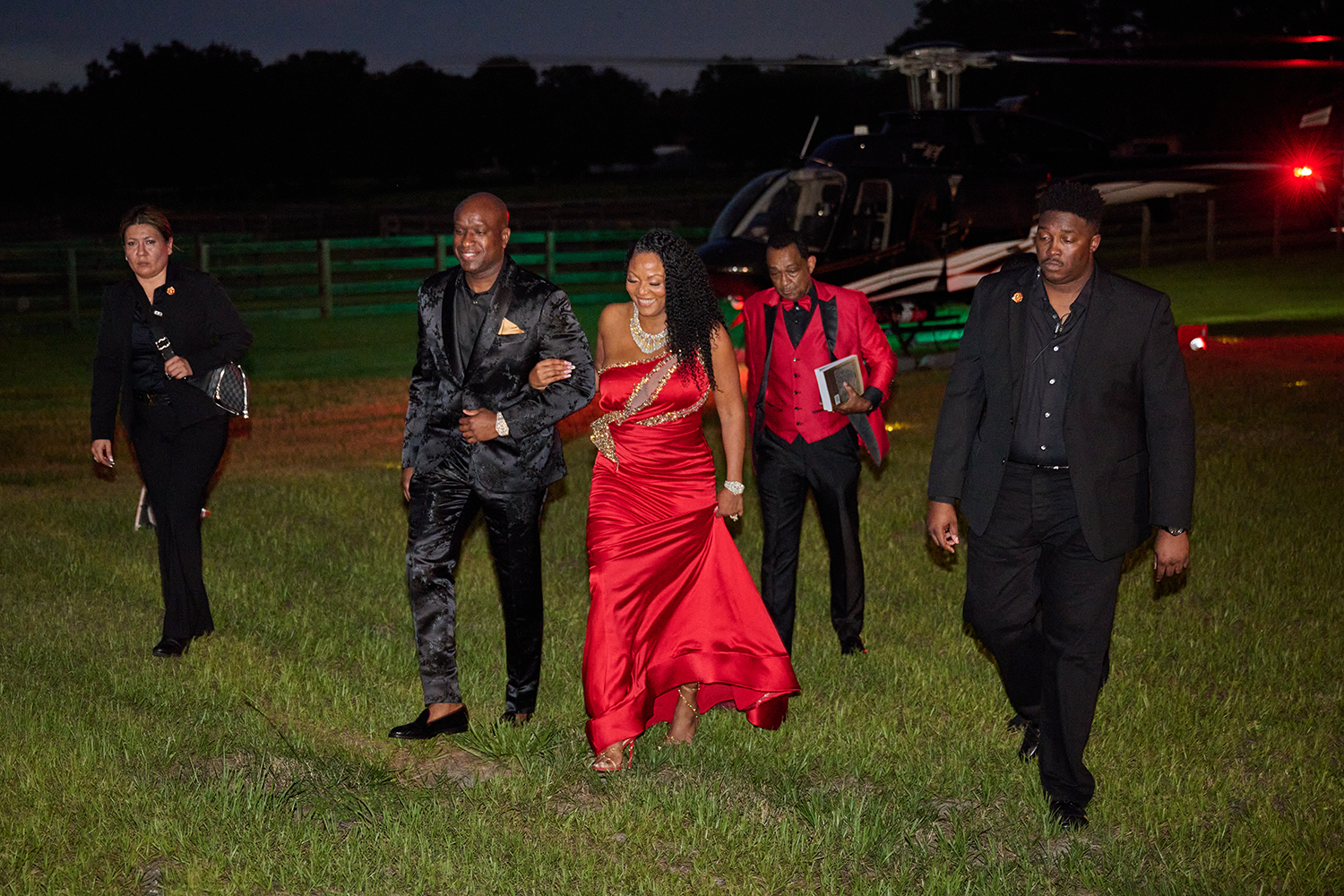
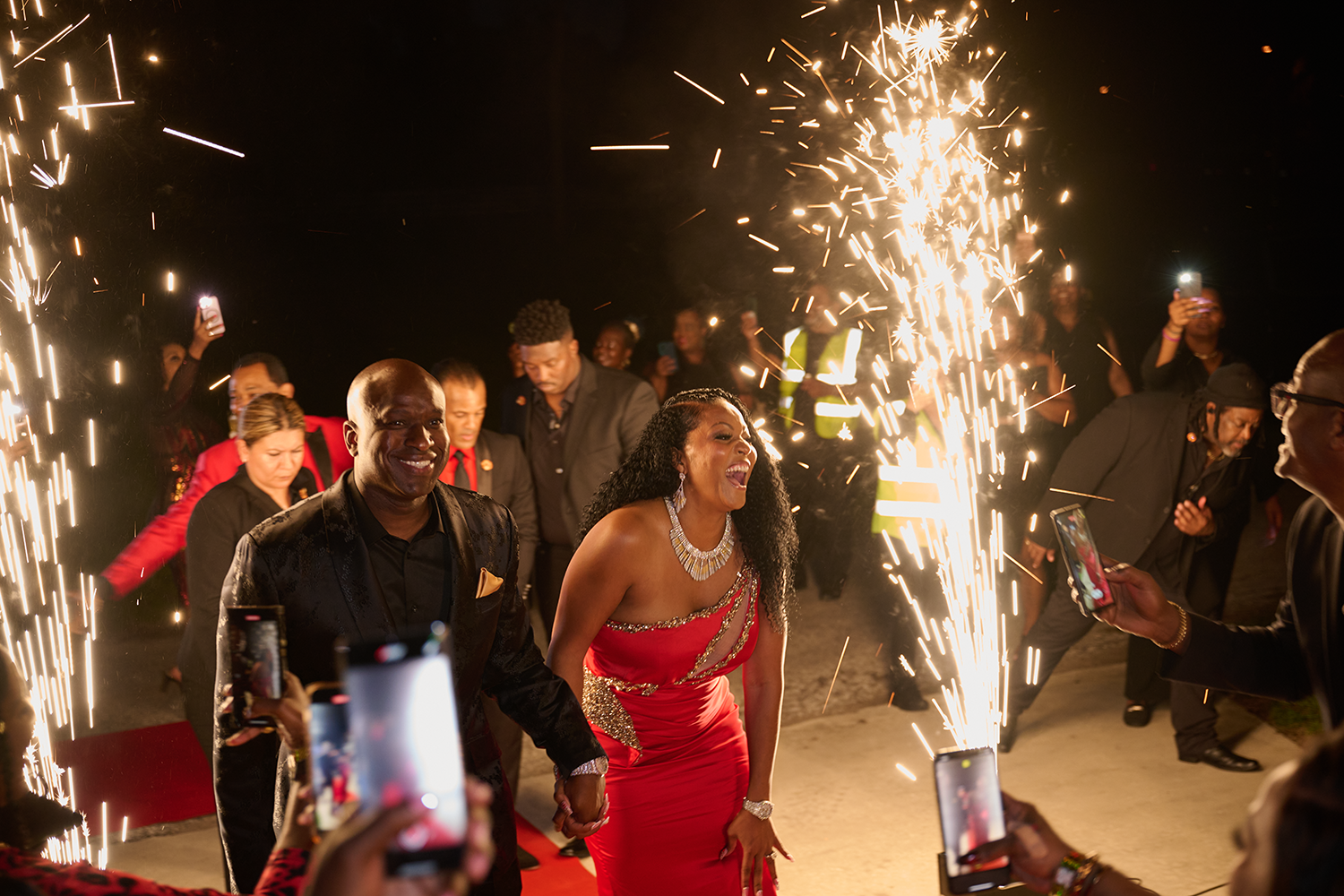
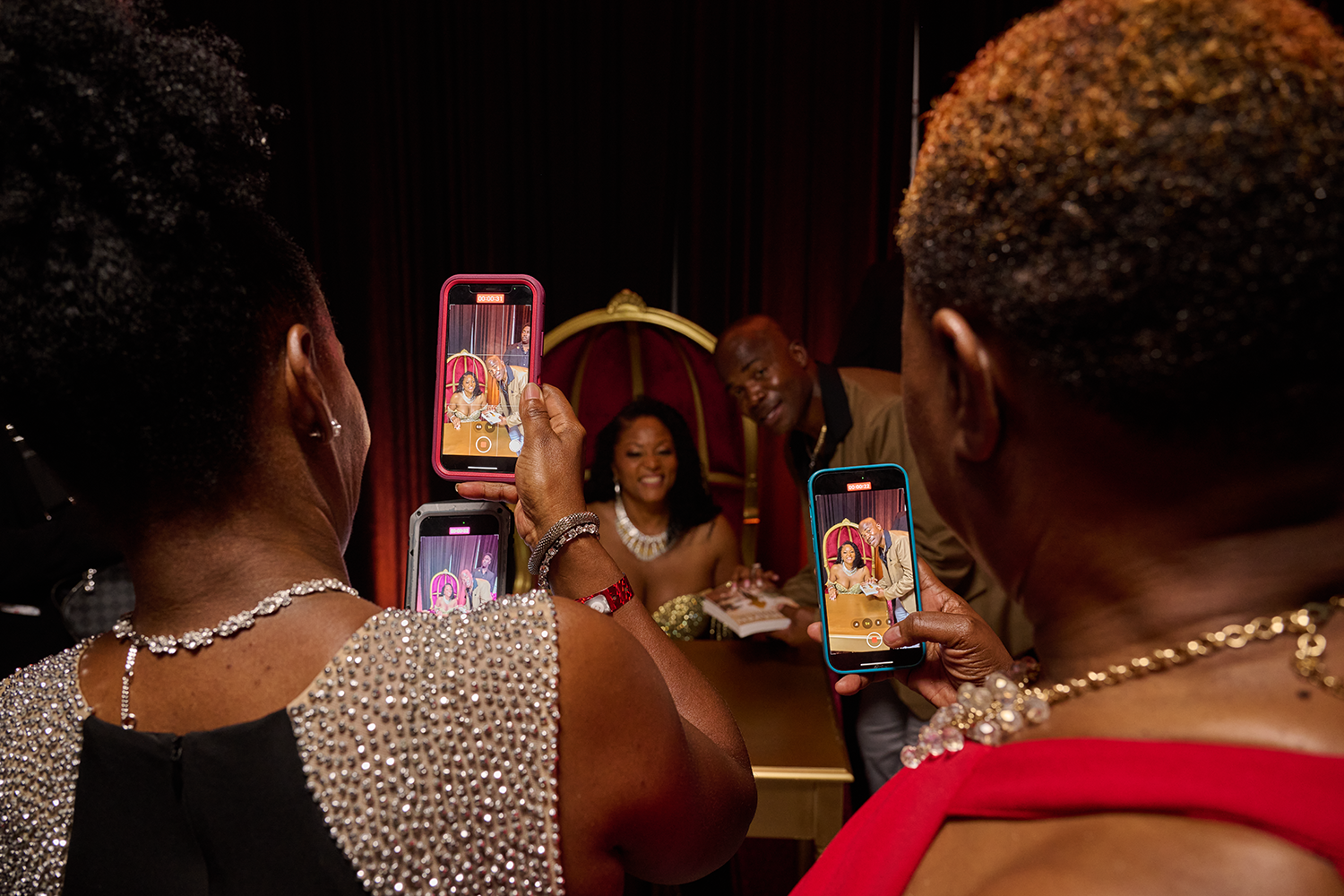
"Bailey's staff calls it her ESP. These mind melds ..."
To celebrate the publication of her radically honest book, Bailey's staff, led by her executive assistant Peteann Burke, hosts a lavish party for her the next evening. It's Saturday night and we are in a throng of people dressed to the nines in black, red, and gold undulating to dancehall reggae in the luxurious main house at Serenity Ranch, her horse facility and events venue.
Bailey arrives at the party in a helicopter that lands on the back lawn at dusk. Clad in a satiny crimson dress and escorted by showgirls, she makes her way into the party as guests chant "Un-bro-ken!" She gives a deeply felt speech of thankfulness and then sits down at a throne heaped with red roses to sign copies of her book.
The energy of the party is just ramping up when Kenny Mulfort steps outside to talk with me. The screenwriter met Bailey when he toured her ranch as a possible set location for his TV movie "Honey + Lemon." He mentioned he had a book, "The Other Side of a Mirror." Bailey read it. And then she called him and asked him to help write her autobiography. Ghostwriting autobiographies is not Mulfort's thing. But Bailey insisted. Which tends to mean it's going to happen. It also means, if she hires you, she believes in you and she will invest in and nurture you, but also respect how you do things, even if — especially if — it is unconventional.
"I told her if I write it, I'm going to make it entertaining, like a story," says Mulfort. We're standing under a palm tree in the humid Orlando night, and he is explaining what it was like to channel Bailey's story into "Unbroken." He describes asking necessary but invasive questions and says Bailey didn't hold anything back, including the suicide attempt and the shocking abuse. "I'm like, I just can't believe this, this is crazy," he says. But as he began to understand how it all happened, it got to the point where they had a kind of mind meld.
Bailey's staff calls it her ESP. These mind melds. How she just understands, without being told, what an employee needs. Or she has a feeling about something, or someone, and then it happens. Bailey tells me it comes from prayer. "I will know things before they happen, and if I pray, my prayer is answered immediately. I will pray tonight, and the very next morning I will get the answer." She says it is her faith, and her conviction that sowing seeds of hope and goodness leads to harvests of blessings, that give her a special ability to take a chance on people.
When she was just starting Bailey's Medical in 2011, she says she ran into a challenge. She found certain neighborhoods in Florida unwelcoming to a Black woman with an accent and jokes that she needed a "pretty white boy" to sell in those areas. Recent college grad Sean Wideberg was recommended by a colleague. And even though he was only 26, with job experience selling lawn-care services door to door, she had that feeling that she could make things work with him. So she took a chance, and he became the first employee of Bailey's Medical.

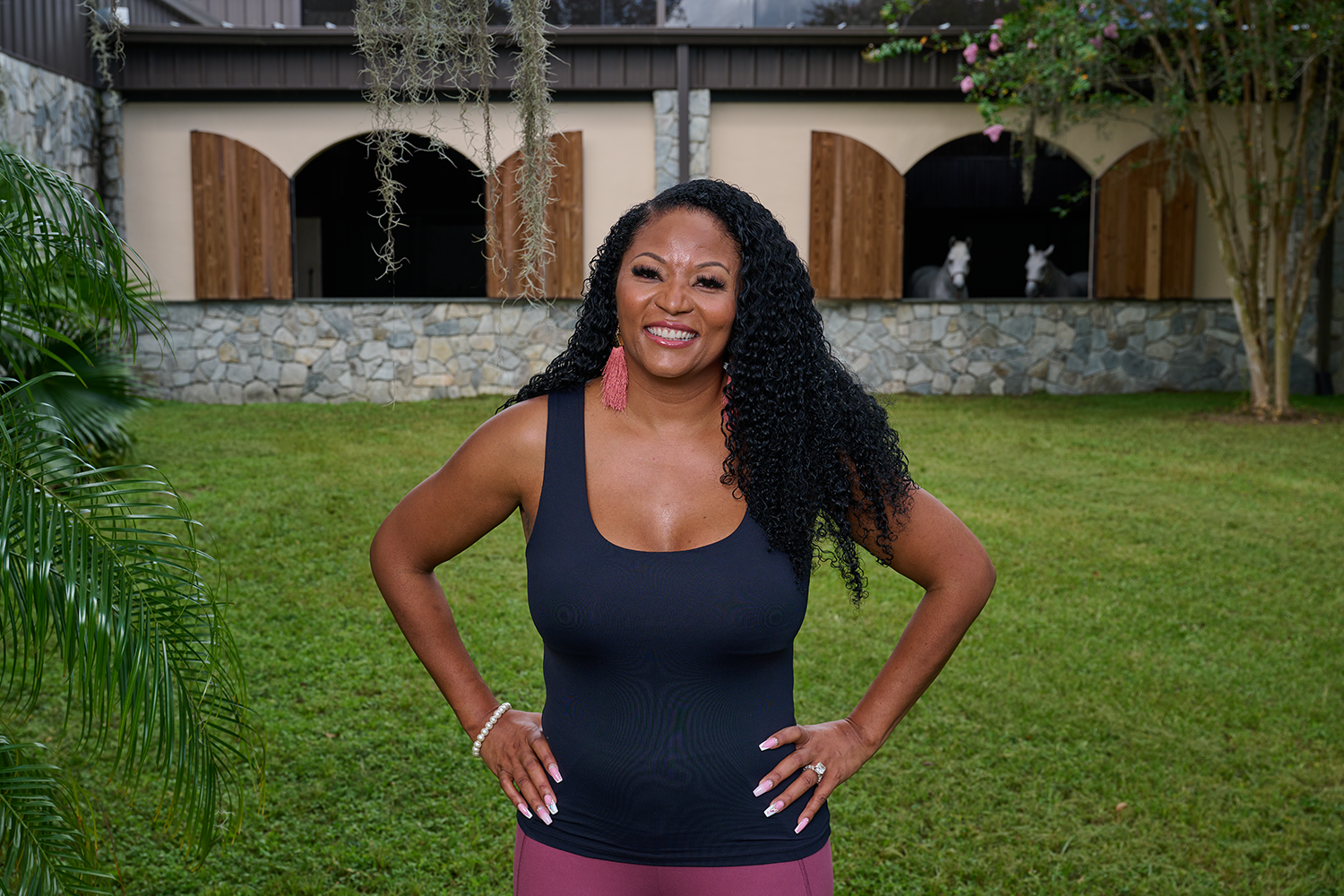
At her 59-stall horse ranch in August.
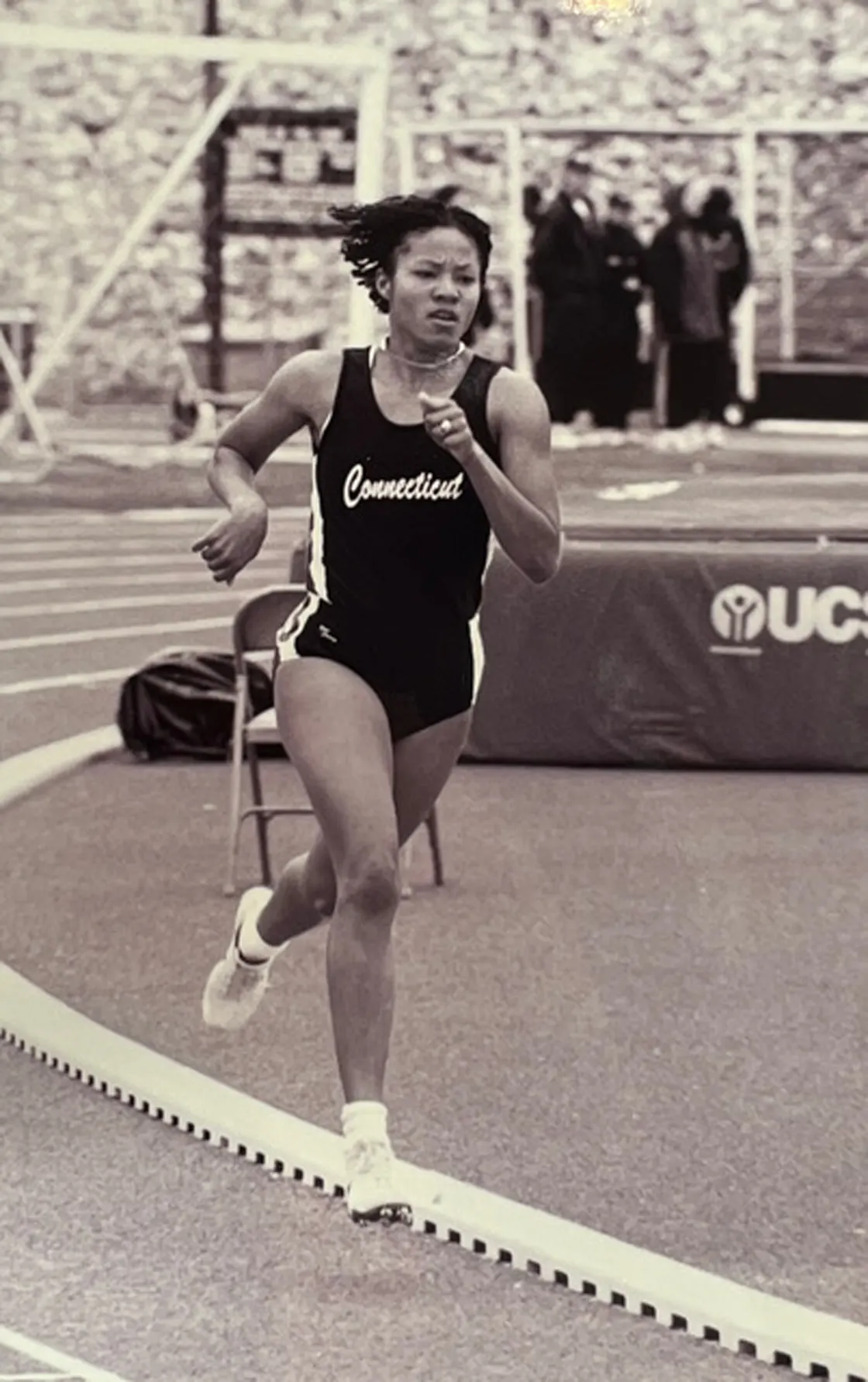
UConn was building its first indoor track when Bailey was on the team. "We had to train in the snow on Horsebarn Hill."
"I went to the interview and she told me she had this vision, and I bought into it. I mean the vision was a 600-square-foot room at that point, no employees, no nothing, but there was a vision there, and we believed in it together," Wideberg says. Sitting at a high top in the foyer surrounded by balloon sculptures, he tells a story about his first sale, a hospital bed, and how Bailey and he delivered it to a man in a dementia ward. One of the other patients in the ward had defecated on the packaging, and as they were cleaning up, Bailey got poop all over her shirt. It didn't faze her, he says, because they had just helped someone, and that's what they do. "We take care of people."
The business grew quickly, and Wideberg with it; he is now COO. Bailey soon had him managing teams of people, many of whom were older than he. He learned leadership from watching her, but also from books she had him read and then give weekly presentations on to the team, a few chapters at a time. He isn't the only one to whom Bailey has assigned book reports — executives whose speaking style she deemed too negative have had to give presentations on positive criticism techniques, for example. This training technique harks back to her UConn tutoring days.
Jessica Dyson, now HR director, started entry level and says she found it disconcerting when Bailey began to offer her more responsibility, asking her opinion on business decisions. "She eased me into it," Dyson tells me. "And that's kind of what she does, to make you grow into the shoes she's trying to give you."
By now, the party has moved into the late night phase, where everyone feels like they've known each other forever. A group of women including past track teammates, pharmaceutical marketers, an advocate for the homeless, and a princess of Sierra Leone dance together next to the indoor pool. Bailey is still signing books. The vibe is full of love.
And the love is real. Bailey has instilled a fundamental ethos into her medical device company: be kind and caring to people in the worst moments of their lives. You might just be delivering a hospital bed, you might get crap all over you, but you can be kind and caring and take care of people while you do it.
As she explained back at her condo the day before the party, the point of her success and wealth — and her book — is to be able to help other people.
Bailey remembers the manager who, early in her career, let her take off as much time as she needed when her grandmother died. "He did that. Now, I take that, and make sure that that is a part of my leadership. I not only care for my employees in work, but I care for them outside. I can't ask you to care for people if I'm not caring for you."

Inspiring story unto itself. but there is only one “Unbroken” book published about Louis Zamperini that exemplifies the true meaning of the word…FYi
Laura Hillenbrand’s two bestselling nonfiction books, Seabiscuit: An American Legend (2001) and Unbroken: A World War II Story of Survival, Resilience, and Redemption (2010), have sold over 13 million copies,
Thank you for leaving a blueprint of inspiration for us to enjoy. Thank you for ushering me into my mission for success. Thank you for paving the way for the next generation to be great!